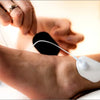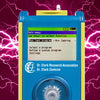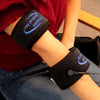What is Peripheral Neuropathy and How does it affect the body?

Peripheral Neuropathy is a condition involving damage or dysfunction of the peripheral nerves, which are responsible for carrying signals between the central nervous system (the brain and spinal cord) and the rest of the body. These nerves control everything from touch and muscle movement to involuntary body functions like digestion and circulation.
When peripheral nerves are damaged, the resulting symptoms can affect mobility, comfort, and independence—posing a significant challenge to quality of life. Although it can arise from many different causes, understanding peripheral neuropathy is the first step toward better management and symptom relief.
Common Symptoms of Peripheral Neuropathy
Symptoms vary based on the type of nerve affected—sensory, motor, or autonomic—and the extent of the damage. The most common signs include:
- Chronic Pain: Often experienced as burning, stabbing, or sharp discomfort, particularly in the hands or feet.
- Tingling and Numbness: A sensation of “pins and needles,” or complete loss of feeling.
- Muscle Weakness: Difficulty in performing daily activities like walking, lifting objects, or buttoning clothing.
- Poor Coordination and Balance: Increases the risk of falls, especially in older adults.
- Autonomic Dysfunction: May affect blood pressure, digestion, sweating, and heart rate regulation.
These symptoms may develop gradually or suddenly, depending on the underlying cause.

What Causes Peripheral Neuropathy?
Identifying the root cause is essential for creating an effective wellness plan. Some of the most common contributors include:
- Diabetes: Chronic high blood sugar levels can damage nerves over time.
- Viral Infections: Such as herpes zoster, HIV, or hepatitis.
- Autoimmune Conditions: Lupus, rheumatoid arthritis, or Sjögren’s syndrome can lead to nerve inflammation.
- Nutritional Deficiencies: Particularly deficiencies in vitamins B12, B6, and E.
- Toxin Exposure: Including alcohol, heavy metals, and certain medications.
- Injuries or Repetitive Stress: Trauma or nerve compression syndromes (e.g., carpal tunnel).
Impact on Daily Life
Peripheral neuropathy can interfere with nearly every aspect of daily living. People may experience:
- Difficulty walking or standing for long periods.
- Challenges with fine motor skills (writing, dressing).
- Disrupted sleep due to pain or tingling sensations.
- Emotional effects such as anxiety, frustration, or depression.
- Reduced social interaction due to fear of falling or discomfort.
This ongoing discomfort often leads people to explore not just conventional treatments but also natural strategies to support nerve health and overall wellness.

Complementary Approaches to Peripheral Neuropathy Support
Although there is no cure for peripheral neuropathy, many individuals turn to complementary therapies that focus on overall nerve function and comfort.
- Nutritional Support: Vitamins and antioxidants play a key role in nerve health. Supplementation with vitamin B12, B6, alpha-lipoic acid, and magnesium is commonly used to support metabolic and neurological function. Turmeric (curcumin) is also known for its antioxidant and circulation-supporting properties.
- Gentle Electrical Stimulation: Devices such as the ReBuilder emit low-voltage electrical impulses to stimulate nerve pathways. These non-invasive devices are used to promote local circulation, comfort, and nerve signaling.
- Acupuncture: A traditional therapy that involves stimulating specific points on the body, acupuncture is believed to enhance circulation and encourage balance in the nervous system.
- Movement-Based Therapies: Exercises like yoga, tai chi, and light aerobic activity are beneficial for improving strength, flexibility, and coordination—reducing the risk of falls while promoting overall wellness.
- Physical Therapy and Massage: Therapeutic massage can ease muscle tension and improve blood flow. Physical therapy, guided by a professional, helps retrain muscle memory and improve gait and coordination.
Final Thoughts
Peripheral neuropathy is a complex condition that can significantly impact a person’s physical, mental, and emotional well-being. While it cannot be cured, many people find relief through an integrated approach that includes supplements, lifestyle changes, and natural therapies.
It's essential to work with a qualified healthcare provider to determine the best combination of strategies based on individual needs. With time, consistency, and the right support, it's possible to manage symptoms and improve daily comfort and mobility.
References
- American Diabetes Association. “Peripheral Neuropathy.” ADA, 2024.
- National Institute of Neurological Disorders and Stroke. “Peripheral Neuropathy Fact Sheet.” NINDS, 2024.
- Mayo Clinic. “Peripheral Neuropathy.” Mayo Clinic, 2024.
- Harati, Y. “Diabetic Peripheral Neuropathies.” Annals of Internal Medicine, vol. 124, no. 1, 1996, pp. 113–122.




